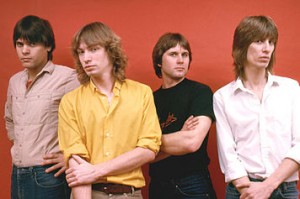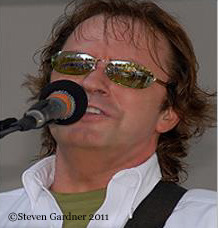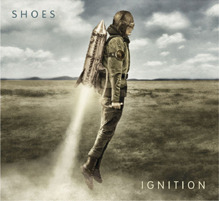Riffs, Rants and Rumors: Shoes Are Back on Their Feet Again
posted in: Features • Rock
 When the rolls of power-pop royalty are read, before one can go back to early-˜70s ur-power-pop bands like Big Star and Badfinger, you have to hail the genre’s late-˜70s/early-˜80s heyday. Among the handful of acts whose names are invariably invoked in that context”Cheap Trick, Dwight Twilley, The Knack, The Rubinoos, etc.”Shoes are always near the top of the list. The Zion, IL band is considered by the cognoscenti to be one of the quintessential bands to combine melodic pop hooks with urgent rock & roll momentum. Their discography boasts stone-cold classic albums like Black Vinyl Shoes (1977), Present Tense (1979), and Tongue Twister (1980), and most of the rest rate just a step behind them. But Shoes released only one new album in the ˜90s, 1994’s Propeller, and haven’t really been heard from since, until now.
When the rolls of power-pop royalty are read, before one can go back to early-˜70s ur-power-pop bands like Big Star and Badfinger, you have to hail the genre’s late-˜70s/early-˜80s heyday. Among the handful of acts whose names are invariably invoked in that context”Cheap Trick, Dwight Twilley, The Knack, The Rubinoos, etc.”Shoes are always near the top of the list. The Zion, IL band is considered by the cognoscenti to be one of the quintessential bands to combine melodic pop hooks with urgent rock & roll momentum. Their discography boasts stone-cold classic albums like Black Vinyl Shoes (1977), Present Tense (1979), and Tongue Twister (1980), and most of the rest rate just a step behind them. But Shoes released only one new album in the ˜90s, 1994’s Propeller, and haven’t really been heard from since, until now.
 Ignition, the first record to feature new Shoes material in 18 years, will be unleashed on August 14. It features all three original Shoes: Gary Klebe and brothers Jeff and John Murphy, all of whom have always made equal singing/songwriting contributions to the band’s albums. In fact, a key aspect of the group’s sound is the way the members’ individual styles blend together to create a true collective identity. Jeff Murphy says it comes from the fact that Klebe and the Murphys all learned their instruments between ˜73 and ˜74 specifically to start Shoes. That’s part of why we communicate so well with each other, Jeff explains, adding the striking admission, We still don’t know anything about music. We can’t read music, we don’t know what proper chord structure is, or scales, or any of that. But we learned together, so we’re all in the same skill level. We speak the same language.”
Ignition, the first record to feature new Shoes material in 18 years, will be unleashed on August 14. It features all three original Shoes: Gary Klebe and brothers Jeff and John Murphy, all of whom have always made equal singing/songwriting contributions to the band’s albums. In fact, a key aspect of the group’s sound is the way the members’ individual styles blend together to create a true collective identity. Jeff Murphy says it comes from the fact that Klebe and the Murphys all learned their instruments between ˜73 and ˜74 specifically to start Shoes. That’s part of why we communicate so well with each other, Jeff explains, adding the striking admission, We still don’t know anything about music. We can’t read music, we don’t know what proper chord structure is, or scales, or any of that. But we learned together, so we’re all in the same skill level. We speak the same language.”
The three teens developed their musical sensibilities together as well. We were, as everybody our age was, influenced by the British Invasion, says Jeff. In the later ˜60s, as things got heavier, we were into The Who and all that. In the ˜70s we started to get into bands like Big Star, very influential in our early days, Nils Lofgren‘s band Grin, Todd Rundgren‘s Something/Anything album, Emitt Rhodes. That was the stuff that really influenced us”Badfinger and that kind of melodic stuff. And when bands like Tom Petty came¦Dwight Twilley and bands like that, we were struggling to get established as well, so we always felt a kinship to bands like that.
 But even though Shoes’ influences”not to mention the concise, catchy gems that soon filled their own albums ”were right in line with what would come to be known as power pop, the band still buckles at the label. Whenever you get a label put on you it’s confining, it becomes a pigeonhole. A lot of our stuff doesn’t really fall in that category. I’m really grateful, we all are, for the fact that that community has embraced us as one of their own, but really we consider ourselves to be a rock band. In ˜75, ˜76, ˜77, when we were just starting to record these albums on our own, unbeknownst to us there was a whole kind of do-it-yourself ethos that was going on with the punk movement. When we first heard The Ramones, God, we thought they were a riot” we loved those guys! And there were elements of that in our music too.
But even though Shoes’ influences”not to mention the concise, catchy gems that soon filled their own albums ”were right in line with what would come to be known as power pop, the band still buckles at the label. Whenever you get a label put on you it’s confining, it becomes a pigeonhole. A lot of our stuff doesn’t really fall in that category. I’m really grateful, we all are, for the fact that that community has embraced us as one of their own, but really we consider ourselves to be a rock band. In ˜75, ˜76, ˜77, when we were just starting to record these albums on our own, unbeknownst to us there was a whole kind of do-it-yourself ethos that was going on with the punk movement. When we first heard The Ramones, God, we thought they were a riot” we loved those guys! And there were elements of that in our music too.
The DIY recordings Murphy’s referring to are the three albums Shoes released in 1976-77 on their own Black Vinyl label before signing to Elektra. These are due to reappear shortly after Ignition‘s release. We did a deal just recently with The Numero Group, Jeff says, and they are releasing on vinyl those earliest albums. They’re gonna release the first one, One in Versailles, in September, then they’re gonna release Bazooka in November, and then in January they’re gonna do Black Vinyl Shoes. In March they’re gonna do the demos that became Present Tense, our first Elektra album.
Of course it was the group’s three Elektra albums that really introduced them to the world at large. But even though they moved abruptly from recording in their home studio on a shoestring budget to working in some of the world’s most renowned studios, their methods”and their results” remained remarkably consistent. The Vice President of Elektra flew in and just blew us away with the offer, ˜You guys obviously know how to record records, so you can produce these things and you’re in charge of the budget,’ remembers Jeff. So we did the first album in England at The Manor, where XTC did Drums & Wires and Mike Oldfield did Tubular Bells. We mixed at Trident in London, where The Beatles did Hey Jude. The second album for Elektra we did at United Western¦The Beach Boys recorded a lot of stuff at United Western. We worked with Richard Dashut, who did Fleetwood Mac‘s Rumours album. We had some wonderful opportunities. Nevertheless, Shoes soon found that their DIY methods served them just as well in these sophisticated settings, and while Present Tense, Tongue Twister, and Boomerang bore a more hi-fi sound, they didn’t differ hugely in feel from the bands homemade productions (that’s a good thing).
But when Shoes didn’t become a hitmaking machine, Elektra pulled the plug following the band’s third album for the label. Once that tenure was over we built our own studio and went back to doing what we had originally done, says Jeff, initially hoping we could get signed to a major label so they could take that momentum from Elektra and carry it, but it didn’t happen. It was a tough time, so out of necessity we started getting back into putting things out on our own. Soon the band was back to basics, keeping things close to home and releasing their records via Black Vinyl again.
Jeff explains that the 18-year gap between albums was ironically due in part to the band members’ immersion in their own studio. We maintained a commercial studio. I ran that and engineered and produced other bands through 2004. Then it was very obvious that digital recording was coming in and studios were on the decline. We decided to sell it and get out before we really got into any financial troubles with it. It was always a struggle to keep it going; so we didn’t record because we were busy being businessmen.”
But home recording is in the band’s blood, and Gary Klebe’s new home studio eventually spurred a new wave of Shoes creativity. Gary bought a new house and unbeknownst to us was quietly building this fantastic studio in his house, says Jeff. And then in 2010, I had written a song [Out of Round] for a friend of mine that had died. I gave it to John and Gary and said, What do you think about this? And Gary said, Hey you want to see my studio? So John and Gary started working on that song. That was kind of the start of recording, and we went, ˜Well, let’s keep going, let’s do some more.’ It’s what we love to do, even though life gets in the way sometimes.
 Jeff agrees that the band is returning to its strengths by building a homegrown album from the ground up once more. One of the things we did in this recording in a lot of ways is return to our roots. We’re back recording at home with nobody but ourselves to please, and doing what we want to hear, and we’re disgruntled with the state of radio just like we were back in the mid-˜70s when we first started. [Laughs] In the end, Shoes are probably best off in simpler circumstance anyhow. We were very unedited on this album, says Jeff. Particularly during the Elektra years there was this kind of pressure to do something that’s not gonna get vetoed by the Vice President¦you’re very conscious of the fact that you’ve got to sell records or you’re not gonna be on the label. So you tend to subconsciously write a certain kind of song. When we wrote this album it was just what came out of us.
Jeff agrees that the band is returning to its strengths by building a homegrown album from the ground up once more. One of the things we did in this recording in a lot of ways is return to our roots. We’re back recording at home with nobody but ourselves to please, and doing what we want to hear, and we’re disgruntled with the state of radio just like we were back in the mid-˜70s when we first started. [Laughs] In the end, Shoes are probably best off in simpler circumstance anyhow. We were very unedited on this album, says Jeff. Particularly during the Elektra years there was this kind of pressure to do something that’s not gonna get vetoed by the Vice President¦you’re very conscious of the fact that you’ve got to sell records or you’re not gonna be on the label. So you tend to subconsciously write a certain kind of song. When we wrote this album it was just what came out of us.
Taking such an organic approach also means Ignition developed at its own pace. That’s kind of the way Shoes operates, says Jeff. There used to be a TV show called Mr. Ed back in the ˜60s, and one of the things in the lyrics of the opening sequence was ˜Mr. Ed will never speak unless he has something to say.’ And that’s kind of what we are. I write a song if I want to say something. When you’re signed to a label you write because you have to keep music coming, that’s your gig. But now we write because we want to, because there’s something that moves us. Maybe that makes it a more honest record, kind of like the earlier stuff that we did”we did it because we loved it. And that’s why we did this record too. We’re not thinking we’re gonna be stars, we’re just saying, ˜Here’s what we are now, and maybe you dig it, hopefully you do, because we had a blast.’
Despite Shoes’ historical standing (Google seminal and power pop and you’re guaranteed to get a bounty of Shoes references), Jeff seems shockingly and genuinely unaware of his band’s influence. I’ve always felt not so much that we were an influence on the other bands as we were part of the same club; we were influenced by the same things they were. If we’ve influenced somebody else, that would be the ultimate compliment. A band like Big Star, they never sold that many records, I never heard a Big Star song on the radio, but they were a huge influence on us. To think that we could influence people like that is kind of overreaching. I think it’s wonderful, but I can’t name a band that has ever cited us as an influence. I’m not aware of it.
Keep in mind we’re talking about a band that has been the subject of a tribute album [Shoe Fetish, of course] featuring Matthew Sweet, R.E.M. producer Don Dixon, and others. When assured of his band’s influential status, Jeff replies, That’s great, I guess that’s the reward for being stubborn and not quitting. We’re in a three-man sack race, and we’re very conscious of everyone enjoying the ride. We’re friends first “ we started out as friends and by God, we’re gonna stay friends if it kills us!”
